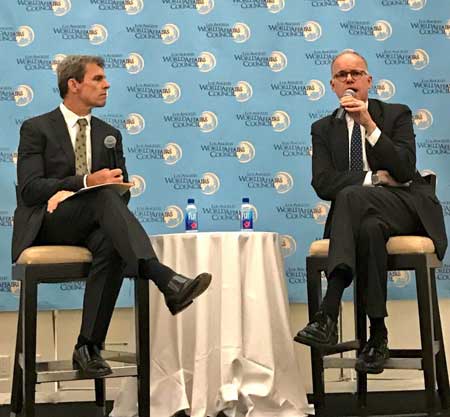
Andrew Weiss (right)
The dangers of an accidental clash between Russian and US forces escalating to a serious confrontation are increasing, particularly in Syria, largely because there is so little regular communication between the two sides. “When I was in the Clinton White House, senior officials talked to their Russian counterparts all the time - but that doesn’t happen any more,” said Andrew Weiss, a Russia expert at the Carnegie Endowment for International Peace. Weiss says the fact that US and Russian military forces are deployed in the chaotic war zone of Syria, supporting different sides in the civil war, is an accident waiting to happen. “This is something I am very anxious about,” he told a LAWAC dinner on April 12th.
At the same time Weiss was very critical of the Russian interference in the US presidential election, which he said was something which “we had never seen before” in the US. “They wanted to make us look foolish and hypocritical and corrupt, and discredit the election - the very hallmark of our democracy.” Weiss said it was curious that there were so many points of contact between Trump’s campaign team and the Russians, and that this needed to be investigated thoroughly in a bipartisan way. “There should have been some red flags disqualifying some of the campaign staff from participating.”
Weiss said that the sudden change in atmospherics between Trump and Putin - from their mutual admiration that was repeatedly expressed during the campaign to the current antagonism - in fact follows a pattern. US Presidents have repeatedly come into power pledging to improve relations with Russia, setting the bar very high - “and then something happens, and relations tumble” - this has been the case with Presidents Clinton, G. W. Bush, Obama - and now it is happening to Trump: both with the election hacking and with their unflinching support of Bashar al Assad in Syria.
The tactics behind the cyber assault are not new. The Russians have been collecting compromising material on their enemies since the 1920’s, shortly after the Russian revolution - but generally this information is kept to be used for blackmailing purposes. “Never before have they dumped so much information in the public domain.” Weiss says he thinks the results of Russia’s hacking attempts achieved far more than they were expecting - “I think they were shocked at the effects” of their hacking activity, just like bin Laden was surprised at the devastation he caused on 9/11.
The Russians started out hacking into Hillary’s campaign with the intention of embarrassing her “but around August Putin himself apparently decided to try to influence the election” so that Trump would win.
Weiss said it was unclear what the investigations would produce and whether any of Trump’s campaign staff would be found to have colluded with the Russians. He also said that retaliation against a cyber attack is notoriously hard - particularly because the counter-attack can be devastating. “We have the sharpest stones, but we live in the glassiest house.”
Asked why Putin was doing this, and what he hopes to achieve, Weiss said that fundamentally it was about the Russian leader’s power. Putin is a very nimble opportunist, and he doesn’t have a political system that keeps him in check. So he can make decisions like sending troops into Ukraine, “and he can move and change things very quickly.” But Putin fears US policy is about regime change in Russia. “He is trying to stay in power - and one of the best ways to do that is to have an external enemy - he is using the US for that. This is political moonshine for him.”
In the end, the US and Russia play by very different rules: “The are a lot of things the US won’t do that Russia will.” The two countries have moved apart, which Weiss describes as “sad… being intimidating and scary is a deliberate part of Russian foreign policy.” He said the two sides should communicate on a more regular basis, and find areas where they can work together - for example on setting up an agreement on access to the Arctic and other non-controversial themes. "We also need to get our militaries talking to each other." This will not fix the problem completely, said Weiss, "but at least it may prevent a disagreement from spiraling.
Click here to read more from Weiss on Trump and Russia, and click here for a joint paper from the Carnegie Endowment on U.S. policy toward Russia, Ukraine and Eurasia.
